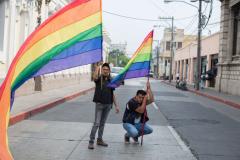
As anti-abortion laws sweep across the United States, similar bills are appearing in Latin America. In Guatemala, far-right congressional members are pursuing passage of a new law they call “Law for the Protection of Life and Family.”
Iniciativa 5272 was first proposed in April 2017 by pro-life members of Congress, including Aníbal Rojas Espino of the Vision with Values or VIVA party, and Fernando Linares Beltranena of the National Advancement Party or PAN. The law has received support from evangelical leaders in Guatemala, who gathered 50,000 signatures for the law and mobilized demonstrations in favor of it.
“The law is the imposing of a way of thinking and of a way of seeing life,” Sandra Morán, a congresswoman from the left wing Convergencia party and Guatemala’s first openly lesbian member of congress, tells The Progressive. “It expresses a fear of difference and diversity. The implication of the law is general control.”
The proposed law is has been met by weekly protests during congressional sessions, which have increased as the law has entered into the third and final debate. Congress will likely not vote on the law until after the current recess ends in June.
The ultra-conservative law in Guatemala goes far beyond the repressive laws in the United States, which threatens prison terms for doctors who perform abortions. The Guatemalan law threatens women suspected of having an abortion with prison sentences of six to twelve years.
“If any woman loses a baby in the first few weeks, this law permits the Guatemalan state to incarcerate her while they investigate the cause,” says Gabriela Dávila, the co-director of the LGBT rights organization Gente Positiva.
“The law is the imposing of a way of thinking and of a way of seeing life. It expresses a fear of difference and diversity. The implication of the law is general control.”
Activists also point out that the language in the law goes far beyond abortion. The law also openly defines a family as being made up of a “father and mother with children,” places all responsibility for sexual education on the parents, and defines sexual diversity as “incompatible with human biology.”
Members of the LGBT community in Guatemala have found an increasingly hostile environment in recent years. The country has seen a rise in murders of members of the LGBT community, including the April 2019 murder of a lesbian couple, Betzi Esmeralda Có Sagastume and Kelli Maritza Villagrán, in the department of El Progreso not far from the capital of Guatemala City. Their bodies were found along the highway with homophobic messages carved into them. Many fear that the ultra-conservative language in the law will lead to more human rights violations.
In addition, the proposed definition of a family as a heterosexual couple has lead to fears of discrimination against single-parent households.
“The law will affect single mothers who have been abandoned or whose partners have migrated, or [single women who have] adopted a child,” Dávila says. “The law will mean that the state no longer recognizes [a single mother] as a family.”
The United Nations’ High Commission on Human Rights called the law “regressive.” Protesters argue that the law is unnecessary, as Guatemala already has one of the most restrictive abortion laws in Latin America: abortion is illegal there under all circumstances, except to save the mother’s life.
Police stand guard in front of the Congress building in Guatemala City during a demonstration against initiative 5272 on May 8.
The similarities between Initiative 5272 in Guatemala and recent laws in the United States are not accidental. According to Morán, evangelical leaders in Guatemala who support the initiative there are influenced by the evangelical movement in the United States.
“There is a direct connection,” she says. “There are churches in Texas that are directly related to churches here in Guatemala. This is historic.”
She points out that has been the case since former dictator Efraín Ríos Montt,a born-again Christian who assumed power in Guatemala following a coup d’état. “Evangelical churches became the base of the counter-insurgency and a means of control of the population.”
Consistent with Morán’s belief that there is a connection between evangelical movements in the United States and Guatemala, Guatemala’s pursuit of this new regressive anti-abortion law comes after a rapid expansion of state-level anti-abortion bills since the beginning of the Trump Administration. These legislative efforts are widely seen as an attack by Republican-controlled state governments against the 1973 Supreme Court decision Roe V. Wade.
“There are churches in Texas that are directly related to churches here in Guatemala. This is historic.”
The Trump Administration has expanded the promotion of anti-abortion efforts worldwide through the U.S. State Department. In March, Secretary of State Mike Pompeo announced his department was cutting funding to the Organization of American States and other organizations and agencies that support abortion rights.
On May 14, Alabama’s state senate passed the most restrictive law against abortion in the country, which threatens any doctor who performs an abortion in cases other than those in which the mother’s life is at risk with up to ninety-nine years in prison. The Republican-dominated state senate struck down an amendment that would have permitted abortions in the case of rape or incest.
The Alabama vote comes a week after Georgia Governor Brian Kemp signed into law a similar anti-abortion bill. Other states are currently pursuingsimilar laws.
Outside of the United States, Morán says right-wing groups are coming together in defiance of worldwide challenges to their beliefs. “On the global level, these conservative organizations and churches are organized. It is a movement that is organized against what they see as an intervention or invasion of thinking from the United Nations.”
